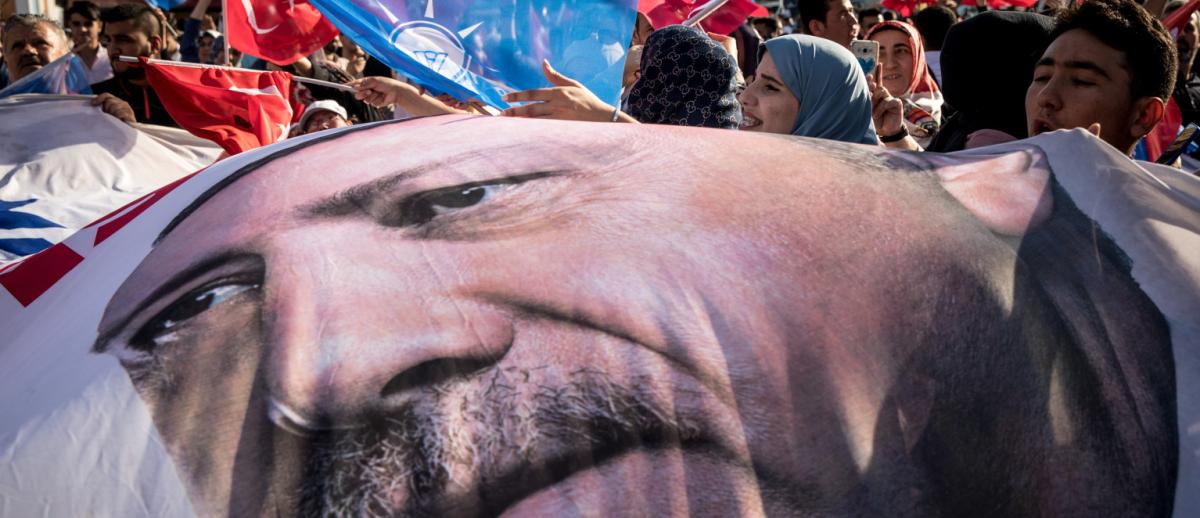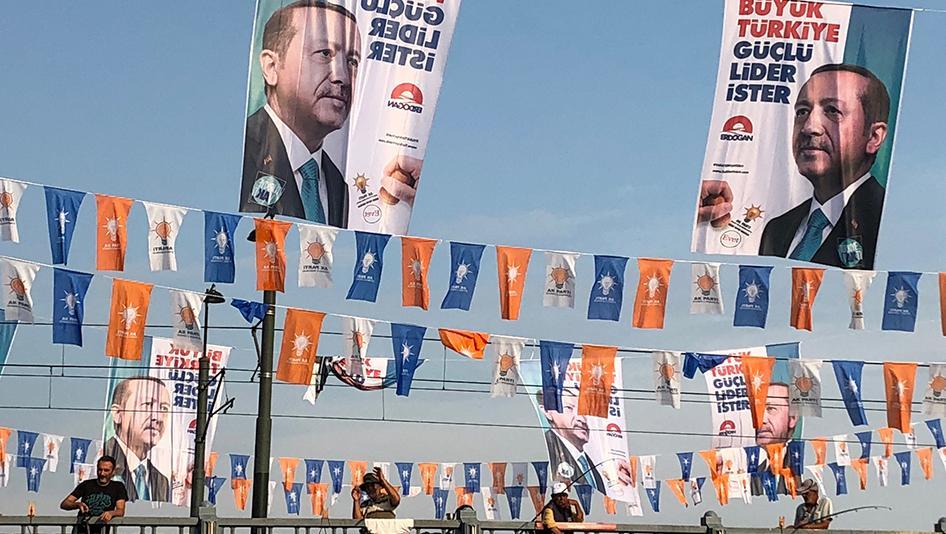Democracy, diversity and the protracted populism of Turkey
archive


flag of Turkey's President Recep Tayyip Erdogan -- campaign rally in Istanbul, June 2018. Photo credit: Chris McGrath/Getty Images
Democracy, diversity and the protracted populism of Turkey
In an inspired essay, Daniele Archibugi and Marco Cellini take up a question that increasingly occupies the minds not only of social scientists but also of people whose lives are being shaped by populist programs across numerous countries: how dangerous is populism for democracy? (2018) In this response, I aim to elaborate on one aspect of this multifaceted and globally relevant question through a brief look at the case of Turkey.
Turkey stands out among other examples of populist rule by the fact that the Justice and Development Party (Adalet ve Kalkınma Partisi, AKP) has been in government for 16 years by winning consecutive elections and continues to maintain its populist discourse. Thereby, it contradicts a common assumption that populist movements lose their anti-establishment appeal once they take up the mantle of governance (Taggart 2004, 284). According to Bilge Yabanci (2016), the AKP has been able to remain in government and keep its populist appeal at the same time due to two kinds of political practices: reproducing novel dichotomies and deepening societal antagonisms. Both political practices of the AKP may, I believe, shed some light on the relationship between populism and democracy.
Nevertheless, two limitations of my discussion should be made explicit right from the start. First, the case of Turkey is characterized by highly specific historical, geographical, institutional, and economic features that antedate and have prevailed during the rule of AKP (Akkoyunlu and Öktem, 2016). Turkey’s case is only one among what Archibugi and Cellini call the “variegated galaxy” of populisms. Second, both populism and democracy are extremely complex and contested concepts. In order to trace their relationship within the context of Turkey, I will focus on the implications of populism on diversity. As Rainer Bauböck points out, diversity is one of the circumstances of democracy; that is, one of the conditions “under which democracy is both empirically possible and normatively necessary” (Bauböck 2018, 7). In other words, there would be no need for democracy in a society that lacks diversity of interests and identities. Focusing on this one aspect, however, requires a considerable amount of abstraction from other aspects of populism (such as use of rhetoric, simplification, leadership and so on) that may depict alternative pictures of the relationship. The aim of this analysis is modest, limited as it is by its scope and reach.
Let me begin by outlining a case for how populism can be beneficial for democracy. Pippa Norris and Ronald Inglehart define populism as “a style of discourse reflecting first order principles about who should rule, claiming that legitimate power rests with ‘the people’ not the elites” (2018, 5). ‘Elites’ refers not only to the ruling political class but also to the established power structures within society that deprive ‘the people’ of meaningful political agency. The populist discourse may then be used as “a strategy for political inclusion” (Urbinati 1998, 3); it may be taken as “a valuable catalyst in the resurrection of the political” (Azmanova 3, 2018); it may be, “quite simply, a way of constructing the political” (Laclau 2005, xi). Insofar as populism enables previously unrecognized demands and identities to find expression, it may be interpreted as enriching public space and enhancing democracy.
These perspectives are not as appalling as they may appear at first sight. First, they fit the self-representation of populist parties well. As Cannovan observes, “[p]opulists see themselves as true democrats, voicing popular grievances and opinions systematically ignored by governments, mainstream parties and the media” (1999, 2). Second, populist programs seem indeed to flourish in societies where parts of the population have been excluded from decision-making mechanisms as well as a meaningful share of welfare. The populism of the AKP may be considered as one such example. Murat Somer describes the old regime, which the AKP had positioned itself against, as constructed around a certain tradition of state-society relationship where the republican and secular elites exercised a top-down and dismissive power over society by means of unaccountable institutions such as the military and the judiciary (2016, 4). As Bilge Yabanci emphasizes, the AKP’s anti-establishment discourse was precisely against this ruling elite, as they blamed the existing regime “for failing to represent the interests of religious masses and for being oppressive, despotic, homogenizing, and top-down” (2016, 8-9).
Insofar as populism enables previously unrecognized demands and identities to find expression, it may be interpreted as enriching public space and enhancing democracy.
Yet, we should not be too hasty in championing the populist discourse of the AKP as contributing to diversity. As it is well recognized in the populism literature, the construction of novel demands and identities is achieved through a particular homogenizing reason that opposes ‘the people’ to ‘the elites’. Once the corrupt and despotic elites are stripped of their political power and the populist discourse dissipates, what remains will be the collective will of the people. Moreover, the people, unified as one, constitute the only legitimate source of political and moral authority. The most explicit expression of such homogenizing reasoning is perhaps found in the simple but totalizing question Recep Tayyip Erdogan, the leader of the AKP and the current president of Turkey, consistently poses his competitors: “We are the people, who are you?”
One may still embrace populism as contributing to democracy by arguing that the populist discourse is self-limiting in practice, and therefore that the danger to diversity is marginal. In the words of Paul Taggart, populist discourse has a shelf-life (2004). A populist movement that assumes power ultimately institutionalizes: it becomes a party of government. The initial claim to being anti-establishment cannot survive long-term tenure in office. After all, the demands of the disenfranchised are now represented at the highest level. Moreover, engaging with conventional forms of politics erodes their populist appeal (Taggart 204, 284). The party either disperses or becomes part of the same ruling elite which it had emerged to challenge in the first place. Given such a life-cycle that places internal barriers to homogenizing reasoning, populism may well be interpreted as a correcting mechanism of liberal democracies: “a “menace card” that citizens insert into the ballot box to achieve better responsiveness from incumbent political parties” (Archibugi and Cellini 2018).

“Great Turkey wants a strong leader” - 2018 election posters of President Recep Tayyip Erdogan. Photo credit: Human Rights Watch
Yet, the case of Turkey presents an alternative picture. The AKP has been able to remain in power and maintain its populist discourse for 16 years. According to Yabanci, there are at least two reasons that have enabled such an outcome. First, the AKP has been able to reconstruct and reemploy populist antagonisms. What constitutes ‘the people’ and ‘the elites’ has significantly changed at the discretion of the party. In the wake of the AKP taking over government, a dichotomy was created between the republican secular establishment (the ‘Kemalist elite’) and ‘the people’, the former allegedly having repressed the latter by means of the state institutions. This led to a major purge of the ‘Kemalist’ establishment, removing them from influential posts in the army and the judiciary. Yet, over the years, a new identity, that of ‘Muslim Nationalism’ with increasing Islamist connotations, was created to redefine ‘the people’ and ‘others’ (Yabanci 2016, 9). Those who rejected this new identity “such as non-religious Kurds, Alevis, liberals, leftists, seculars and all dissidents, have been labelled as enemies of the nation and the people” (Yabanci 2016, 9). Moreover, with the political order characterized by the state of emergency implemented after the coup attempt of 15 July 2016, the AKP was able turn this dichotomy into another purge that aimed to shut out all critical voices (Öktem and Akkoyunlu 2016). Contrary to Taggart’s reasoning, as long as the leaders are able to unearth and exploit novel antagonisms within society, the shelf life of populist movements may be greatly protracted.
the AKP has been able to reconstruct and reemploy populist antagonisms. What constitutes ‘the people’ and ‘the elites’ has significantly changed at the discretion of the party.
What is even more striking is that the AKP was able to conserve the homogenizing discourse in a country that is as socially diverse as Turkey. Yabanci’s evaluations are also illuminating in this respect. She argues that the AKP’s populism is not limited to the political level, but aims to deepen antagonisms at different societal levels by controlling and dividing civil society. To this end, the AKP has created dependent labor unions and women’s organizations that present “themselves as the genuine representatives of workers and women in a polarizing manner and by denying other organizations as elitist” (Yabanci 2016, 18). At the same time, the production of critical knowledge and dissemination of information was put under check by top-down pressures on academic institutions and major media outlets (Öktem and Akkoyunlu 2016). In turn, any demand that does not conform to the new identity of the people is excluded from the public space.
The populism in Turkey differs in many aspects from other contemporary contexts across the globe where populist movements have emerged. Yet, it provides us with a unique example for understanding a major threat posed by populism to democracy. The problem with protracted versions of populism, as in the case of Turkey, lies not only in the obstacles they create to democratic practices via their homogenizing reason but also in the long-term effects on diversity and the fabric of society, which ultimately renders even slimmer the prospect of restoring a functioning democracy.
Archibugi, Daniele and Marco Cellini. 2018. “How dangerous is populism for democracy?” global-e 11(21), 2018.
Akkoyunlu, Karabekir and Kerem Öktem. 2016. “Existential insecurity and the making of a weak authoritarian regime in Turkey.” Southeast European and Black Sea Studies 16(4): 505-527.
Azmanova, Albena. 2018. “The Populist Catharsis: On the Revival of the Political.” Philosophy and Social Criticism.
Bauböck, Rainer. 2018. “Democratic inclusion: A pluralist theory of citizenship.” In Democratic Inclusion: Rainer Bauböck in Dialogue. Manchester: Manchester University Press.
Canovan, Margaret. 1999. “Trust the people!” Political Studies 47(1): 2–16.
Laclau, Ernesto. 2005. On Populist Reason. New York and London: Verso.
Norris, Pippa and Ronald Inglehart. 2018. Cultural Backlash: Trump, Brexit and the Rise of Authoritarian Populism. New York: Cambridge University Press.
Öktem, Kerem and Karabekir Akkoyunlu. 2016. “Exit from democracy: illiberal governance in Turkey and beyond.” Southeast European and Black Sea Studies 16(4): 469-480. DOI: 10.1080/14683857.2016.1253231
Somer, Murat. 2016. “Understanding Turkey’s democratic breakdown: old vs. new and indigenous vs. global authoritarianism.” Southeast European and Black Sea Studies. DOI: 10.1080/14683857.2016.1246548
Taggart, Paul. 2004. “Populism and representative politics in contemporary Europe.” Journal of Political Ideologies 9(3): 269–288.
Urbinati, Nadia. 1998. “Democracy and populism.” Constellations 5(1): 110–124.
Yabanci, Bilge. 2016. “Populism as the problem child of democracy: the AKP’s enduring appeal and the use of meso-level actors.” Southeast European and Black Sea Studies. DOI: 10.1080/14683857.2016.1242204



